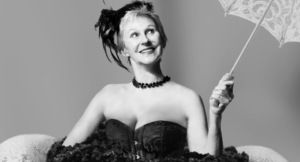Things to do
Preview: Why Not Theatre presents Samuel Beckett’s ‘Happy Days’
This article is more than 4 years old.

Sue Hansen-Styles and Nathan Meister star in Peter Dupont Weiss’ production of Beckett’s unsettling modern classic (photo: Robin Skjoldborg/Mike Tylak)
The work of Samuel Beckett is both profound and confounding. His oeuvre of absurdist literature contains some of the most important modernist works of the 20th century – and yet they are, at times, pure head-scratchers. Funny, ruthless and philosophical, few writers ignite such deep and unsettling self-examination.
A simple premise
‘Happy Days’ is among one of his most masterful plays. Spare and introspective, the premise is incredibly simple: a woman is buried up to her waist in a mound of earth under the beating sun, where she remains trapped for the duration of the play. The woman, Winnie (in this production: Sue Hansen-Styles), muses on her situation and distracts herself with a bag containing a few everyday objects … and a gun. Alone on stage, she is occasionally visited by a man called Willie, who emerges to grumble a few words before slinking away.
As Winnie grapples with hope and hopelessness, we’re asked to question whether either or both are delusional. Her monologues, often flights of fancy that teeter on madness, are on a short leash. We are repeatedly yanked back to her bleak, buried-alive reality.
Ageless questions
The compelling determinism of Happy Days, along with its absurd humour, isolation and questions of raw survival, resonate profoundly with contemporary issues of climate change and COVID-19. Meanwhile, Beckett’s signature Russian-doll existentialism offers little comfort. We cling to logic, unpacking concepts one after the other, following the thread only to find that it leads … nowhere. Or back to the start.
Happy Days turns 60 this year and continues to reflect seismic world issues as clearly as it does the timeless human condition. Perhaps more than anything, it’s a Rorschach test for the audience.
From September 3-25, Happy Days will be performed at Teatret Ved Sorte Hest – one of Copenhagen’s oldest, most intimate theatres – by the Why Not Theatre Company.
Book your tickets here.










































